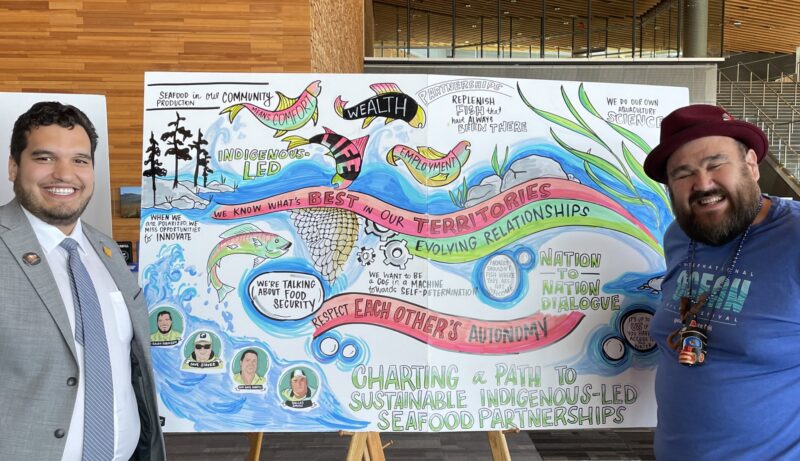BC reiterates support for salmon farming First Nations
“First Nations which have oversight over aquaculture in their territories should have a direct role in determining the future of salmon farming in BC – Govt. of BC”
By Fabian Dawson
SeaWestNews
Salmon farming First Nations in British Columbia should have a direct role in determining the future of aquaculture on Canada’s west coast says the provincial Ministry of Water, Land and Resource Stewardship.
In a statement to SeaWestNews, the ministry said the Federal Government’s efforts to transition BC’s salmon farming sector must also include economic supports for coastal First Nations and communities that rely on the industry.
Acknowledging the continued social licence challenges the industry faces with those in B.C. advocating for the withdrawal of licences for open-net salmon farms, the ministry said: “It is important that a federal transition plan considers the time and supports that allow industry to transition to newer technologies and practices.”
“A transition plan will also need to provide economic supports for coastal First Nations and communities that rely on this industry.
“We also acknowledge that First Nations who have an oversight role over these farms in their territories should have a direct role in determining how this transition should occur.”
In response to questions from SeaWestNews, the ministry said BC respects the federal jurisdiction in ensuring that provincial aquaculture operations minimize risk to wild fish stocks and the environment.
The statement comes in the wake of coastal First Nations in British Columbia calling on Ottawa to renew salmon farming licences in their traditional territories for a period of nine years as the Federal Government works on the transition plan.
The Coalition of First Nations for Finfish Stewardship (FNFFS) said the immediate renewal of long-term salmon farm licensing for nine years will encourage investments in emerging technologies as well provide First Nations time to conduct research and trials on new technologies in their territories.
The Coalition recently delivered its plan titled, “Indigenous-led Finfish Aquaculture Transition Framework” to the new Fisheries Minister Diane Lebouthillier, who is meeting with First Nations and industry stakeholders on Vancouver Island this week.
It comprises 17 BC First Nations which have agreements for farming salmon in their territories resulting in all salmon farmed in the province falling under a beneficial partnership with a First Nation.
“If Canada is going to walk the talk on true reconciliation, I think every Canadian would agree that the future of modern salmon farming in BC must be shaped by the coastal First Nations in whose territories the farms are located,” said Coalition spokesperson Dallas Smith, after delivering the plan to Minister Lebouthillier in Ottawa late last month.
The Federal Government’s Transition plan, expected in 2024, will involve 79 open-net farms which have been licensed to operate till next June. It will also impact about 5,000 jobs and $1.2 billion in economic activity annually.
The BC government’s latest statement reflects the stance taken by former premier John Horgan who had cautioned Ottawa that its actions could end up violating the rights of First Nations who want salmon farming in their traditional territories.
“Any federal licensing decisions should be made in a thoughtful and systematic way that fully engages those First Nations most impacted by the decision, provides the necessary time and clarity for businesses to adjust investment decisions, and does not pre-empt larger policy decisions by Canada, BC and First Nations on the future of the industry,” Horgan said in a letter to Prime Minister Justin Trudeau.
“Development of a transition plan for open-net pen salmon farming must also include a corresponding transition plan for those First Nations and communities that rely on the economic opportunities provided by the salmon farm industry, as well as a new technology adoption plan that may provide new economic opportunities in BC,” he said.
Meanwhile, the Federal Court in Vancouver has begun hearing the application for a judicial review of an earlier government decision that led to the closure of salmon farms in BC’s Discovery Islands.
The Wei Wai Kum First Nation (Campbell River Indian Band), and We Wai Kai First Nation (Cape Mudge Indian Band) along with BC’s largest salmon farmers are challenging the decision made by former Fisheries Minister Joyce Murray on Feb 17, 2023.
Murray, the First Nations claim, has usurped their rights as titleholders in the Discovery Islands and the surrounding area; the right to decide how their lands and waters would be used and the right to the economic benefits of their lands, waters and resources.
The salmon farmers are seeking answers as to why the Liberal government wanted to shut down their operations in the Discovery Islands when their own scientists say the aquaculture operations pose less than a minimal risk to migrating stocks.
Image shows Isaiah Robinson, Deputy Chief Councillor for Kitasoo Xai’xais Nation (left) with
Dallas Smith, spokesperson for the Coalition of First Nations for Finfish Stewardship at the Indigenous Partnerships Success Showcase (IPSS) event in Vancouver.

